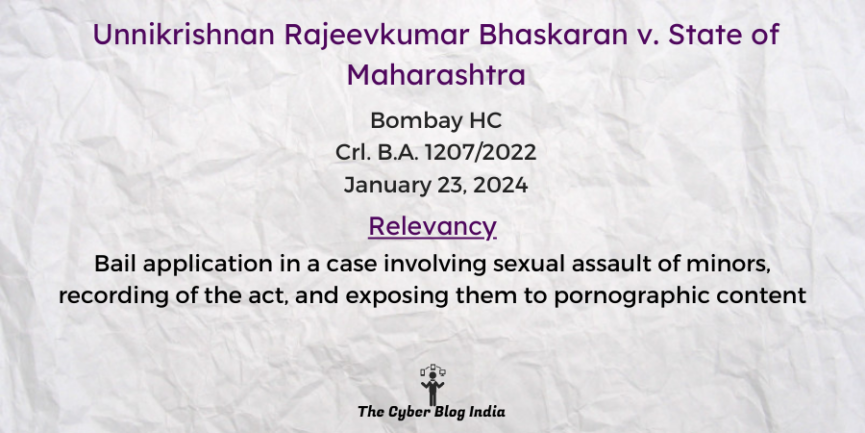Unnikrishnan Rajeevkumar Bhaskaran v. State of Maharashtra

Unnikrishnan Rajeevkumar Bhaskaran v. State of Maharashtra
In the High Court of Bombay
Crl. B.A. 1207/2022
Before Justice Prithviraj K. Chavan
Decided on January 23, 2024
Relevancy of the case: Bail application in a case involving sexual assault of minors, recording of the act, and exposing them to pornographic content
Statutes and Provisions Involved
- The Information Technology Act, 2000 (Section 43(a), 67A)
- The Indian Penal Code, 1860 (Sections 376, 500, 506)
- The Protection of Children from Sexual Offences Act, 2012 (Sections 4, 6, 8, 12, 29, 30)
- The Code of Criminal Procedure, 1973 (Section 161, 164, 439)
Relevant Facts of the Case
- The applicant was put behind bars for alleged sexual assault and hacking into victims’ phones. The applicant was related to the victim, and often visited each other. Victims at the ages of 9 and 13 revealed the sexual assault to their mother.
- The applicant reportedly exposed them to pornographic videos, physically assaulted them, recorded videos and photos during their visits to his house, and used these materials for blackmail. He also hacked their mobile phones and sent offensive messages.
- The victim’s mother did not report the incident immediately. The applicant apologised to the victim’s father through text messages for his conduct. The applicant reported the matter two days after their father’s death.
- The Sessions Court rejected the first bail application. Hence, the applicant has filed the current bail application.
Prominent Arguments by the Advocates
- The applicant’s counsel argued that :
- The applicant had been falsely implicated due to a family property dispute. His wife was asked to give up her share in the partition, but they refused.
- Additionally, he contended that no mobile phones were hacked, citing a lack of reports from the Forensic Science Library.
- The complainant reported the incident late, and inconsistencies in the statement with the medical reports indicate false allegations.
- Further, the text messages do not indicate any confession on his part. He is also a permanent resident and cannot abscond.
- The respondent’s counsel submitted that:
- As the applicant was a close relative, he took advantage of the trust reposed on him by the minor victims. He also administered medicines to them.
- In such cases, it is expected for the victims to report the assault at a later stage due to intimidation and fear. Hence, medical reports do not rule out sexual assault.
- The applicant’s apology indicates he regretted his acts and is an implied confession.
- He also contended that the applicant might intimidate victims and tamper with evidence if released on bail.
Opinion of the Bench
- The court agreed with the respondent’s counsel. The delay was justifiable as the victims were minor, and the applicant had intimidated them. There are no contradictions in the victims’ statements, as the case was reported late, and medical reports do not rule out the possibility of sexual assault.
- The applicant’s text message to the father indicates his regret for his actions, which is an important consideration at this stage of the trial.
- The victims and the applicant are closely related; hence, there is a possibility of adverse impact on the victims’ minds on his release. He may also abscond as he is not a permanent resident of Maharashtra.
Final Decision
- The court rejected the bail application.
Nandita Karan Yadav, an undergraduate student at the National Law Institute University, Bhopal, prepared this case summary during her internship with The Cyber Blog India in May/June 2024.
